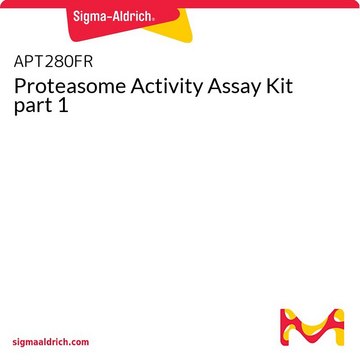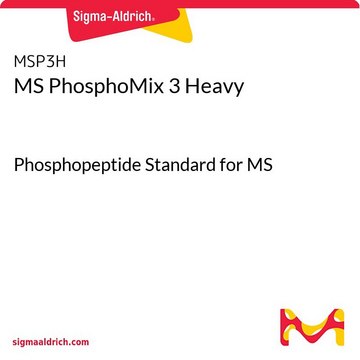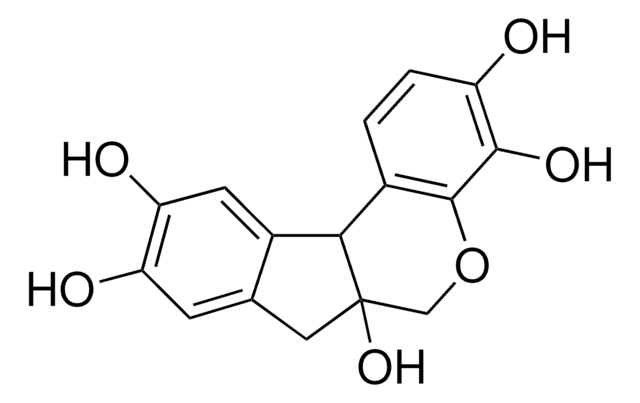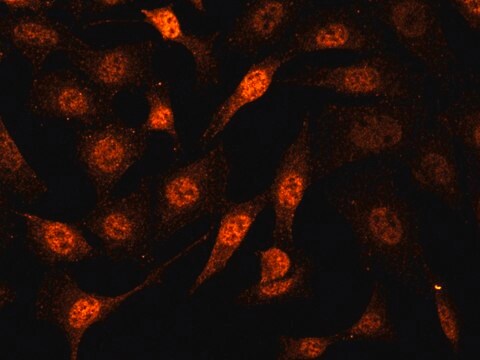APT280
20S Proteasome Activity Assay
Sinonimo/i:
20S Proteasome Assay, Proteasome Activity Kit, Proteasome Assay, proteosome activity assay kit
Autenticatiper visualizzare i prezzi riservati alla tua organizzazione & contrattuali
About This Item
Codice UNSPSC:
12161503
eCl@ss:
32161000
NACRES:
NA.84
Prodotti consigliati
Nome Commerciale
Chemicon®
Livello qualitativo
Reattività contro le specie
mammals
tecniche
activity assay: suitable
Descrizione generale
Introduction:
The ubiquitin-proteasome pathway is the major proteolytic system in the cytosol of eukaryotic cells, where it catalyzes the selective degradation of short-lived regulatory proteins and the rapid elimination of proteins with abnormal conformation (Hershko & Ciechanover 1998; Hochstrasser 1996). The critical protease in this pathway is the 26S proteasome, an ATP-dependent proteolytic complex, which is formed by the association of the barrel-shaped 20S proteasome (700-kDa) and two 19S (700-kDa) regulatory complexes (Baumeister et al. 1998; Coux et al. 1996). The 20S Proteasome, catalytic core of the proteasome complex, is responsible for the breakdown of key proteins involved with apoptosis, DNA repair, endocytosis, and cell cycle control (Coux et al. 1996; Hoffman & Rechsteiner 1996; Hochstrasser 1995). The CHEMICON® Proteasome Activity Assay Kit provides a quick, efficient and sensitive system for evaluation of proteasome activity in cell lysates or inhibitor screening.
Test Principle:
Chemicon′s Proteasome Activity Assay Kit provides a simple and convenient means for assaying proteasome activity that recognize the substrate LLVY (Meng et al. 1999). The assay is based on detection of the fluorophore 7-Amino-4-methylcoumarin (AMC) after cleavage from the labeled substrate LLVY-AMC. Absorption=351nm. Emission=430nm. The free AMC fluorescence can be quantified using a 380/460 nm filter set in a fluorometer.
A proteasome inhibitor, Lactacystin, is included as a test inhibitor for screening purpose. Lactacystin is a microbial natural product and the most specific and potent inhibitor of proteasomes currently known (Fenteany & Schreiber 1998).
Application:
The Proteasome Activity Assay Kit is a relatively quick method for detection of intracellular proteasome activity. Testing of purified proteasome enzyme, in vitro inhibitor screening and the study of proteasome regulation can be performed with this assay.
The CHEMICON Proteasome Activity Assay Kit is intended for research use only, not for diagnostic or therapeutic applications.
The ubiquitin-proteasome pathway is the major proteolytic system in the cytosol of eukaryotic cells, where it catalyzes the selective degradation of short-lived regulatory proteins and the rapid elimination of proteins with abnormal conformation (Hershko & Ciechanover 1998; Hochstrasser 1996). The critical protease in this pathway is the 26S proteasome, an ATP-dependent proteolytic complex, which is formed by the association of the barrel-shaped 20S proteasome (700-kDa) and two 19S (700-kDa) regulatory complexes (Baumeister et al. 1998; Coux et al. 1996). The 20S Proteasome, catalytic core of the proteasome complex, is responsible for the breakdown of key proteins involved with apoptosis, DNA repair, endocytosis, and cell cycle control (Coux et al. 1996; Hoffman & Rechsteiner 1996; Hochstrasser 1995). The CHEMICON® Proteasome Activity Assay Kit provides a quick, efficient and sensitive system for evaluation of proteasome activity in cell lysates or inhibitor screening.
Test Principle:
Chemicon′s Proteasome Activity Assay Kit provides a simple and convenient means for assaying proteasome activity that recognize the substrate LLVY (Meng et al. 1999). The assay is based on detection of the fluorophore 7-Amino-4-methylcoumarin (AMC) after cleavage from the labeled substrate LLVY-AMC. Absorption=351nm. Emission=430nm. The free AMC fluorescence can be quantified using a 380/460 nm filter set in a fluorometer.
A proteasome inhibitor, Lactacystin, is included as a test inhibitor for screening purpose. Lactacystin is a microbial natural product and the most specific and potent inhibitor of proteasomes currently known (Fenteany & Schreiber 1998).
Application:
The Proteasome Activity Assay Kit is a relatively quick method for detection of intracellular proteasome activity. Testing of purified proteasome enzyme, in vitro inhibitor screening and the study of proteasome regulation can be performed with this assay.
The CHEMICON Proteasome Activity Assay Kit is intended for research use only, not for diagnostic or therapeutic applications.
Applicazioni
Lysis buffer: 50 mM HEPES (pH 7.5), 5 mM EDTA, 150 mM NaCl and 1% Triton X-100. Addition of 2 mM ATP to the lysate will improve the recovery of intact 26S proteasome.
Also see: Hoffman, L. 1992 at http://www.jbc.org/cgi/reprint/267/31/22362.pdf
Also see: Hoffman, L. 1992 at http://www.jbc.org/cgi/reprint/267/31/22362.pdf
The Proteasome Activity Assay Kit provides a simple & convenient means for assaying proteasome activity that recognize the substrate LLVY.
Altre note
Unless otherwise stated in our catalog or other company documentation accompanying the product(s), our products are intended for research use only and are not to be used for any other purpose, which includes but is not limited to, unauthorized commercial
Note legali
CHEMICON is a registered trademark of Merck KGaA, Darmstadt, Germany
Non trovi il prodotto giusto?
Prova il nostro Motore di ricerca dei prodotti.
Codice della classe di stoccaggio
10 - Combustible liquids
Certificati d'analisi (COA)
Cerca il Certificati d'analisi (COA) digitando il numero di lotto/batch corrispondente. I numeri di lotto o di batch sono stampati sull'etichetta dei prodotti dopo la parola ‘Lotto’ o ‘Batch’.
Possiedi già questo prodotto?
I documenti relativi ai prodotti acquistati recentemente sono disponibili nell’Archivio dei documenti.
Il team dei nostri ricercatori vanta grande esperienza in tutte le aree della ricerca quali Life Science, scienza dei materiali, sintesi chimica, cromatografia, discipline analitiche, ecc..
Contatta l'Assistenza Tecnica.








